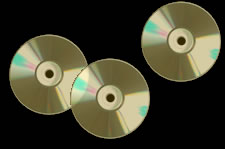 Mp3,
CD, or DVD, good mastering will improve your record!
Mp3,
CD, or DVD, good mastering will improve your record!
![]()
 Mp3,
CD, or DVD, good mastering will improve your record!
Mp3,
CD, or DVD, good mastering will improve your record!
|
| ||||
|
What is Mastering? The term "mastering" was
originally used to describe the process used to create stampers
for
manufacturing vinyl records. Since the advent of CDs, it has referred
to the process, at it's simplest, where finished music mixes have
been assembled together with specific data coding in preparation
for CD duplication. Today, the term "mastering"
could probably best be described as the preparation of music from
any recorded format for distribution in any number of possible
formats. CD, DVD, Mp3, etc. |

|
|||
|
||||

Why is it essential today? The current "sound"
of major label CDs has been produced by talented mastering engineers
using very expensive high quality audio gear. They have been able to
produce CDs which are loud and vibrant and this sound has become the
reference by which all other product is compared. Unmastered projects
often sound soft and flat relative to this highly enhanced standard. In addition to this high sonic bar, there are several other factors which make mastering more essential today than ever before. Unlike in the past when music was primarily mixed in professionally designed studios, much of today's music is mixed at home or in project studios with poor room acoustics. One of the most persistent myths in audio is that with near field monitoring (close speakers), the room's acoustics don't matter. Music mixed in these environments almost always need low frequency correction during mastering. In addition to this, modern production techniques can enable each song to have a completely different arrangement and can create quite a challenge during mastering to produce a consistent sounding project. Finally, although it's great that more people are making more music today than in any other time in history, many young mixers today lack the experience necessary to create well balanced and open sounding mixes. It's amazing what can be done in mastering to save these less than stellar mixes. |
||||
|
|
 |
 |
 |
|
| Can
you do it yourself? Of
course! There are many choices for software or plug-ins that will
enable
you to create a CD which can be duplicated. Does this mean your project
will sound the best that it could be? To do mastering that competes
with professional product, it is essential to have the proper high
quality monitoring and equipment, not to mention the experience and
skill. Without
good acoustical treatment, few rooms will even enable a monitoring
system accurate enough for quality mastering. See Monitoring
In terms of gear, few workstations compare in quality to the Sonic
Solutions, the first choice among mastering
engineers, or the other highly modified devices I use. Without proper
power conditioning, high quality word clocking, and the best
digital and analog cabling available, one simply cannot achieve the
same results.
Working in digital audio without these usually results in mixes which
exhibit a harshness or graininess, less depth or spaciousness, and
a
loss of real bottom. Even burning a master CD without
incurring a loss of fidelity takes the proper equipment and experience.
Finally, as talented of a mixer that you may be, you probably don't
have the experience or "ears" that have been honed in for
the mastering process. |
||||